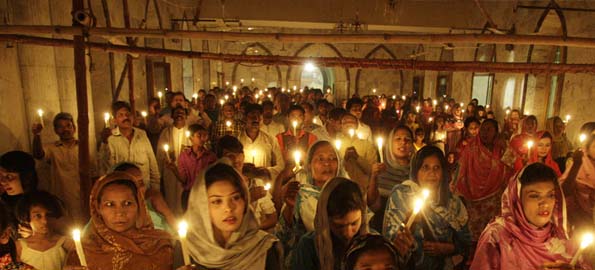Panelists at a religious freedom session on Pakistan called for reform of the nation’s laws, calling the situation for minorities dire.
In June alone, 47 religious minorities were killed in Pakistan, according to the U.S. Commission on International Religious Freedom.
The victims included an 18-year old Christian man tortured to death by police after he was suspected of kidnapping a Muslim woman, the commission said.
“Basic law enforcement and legal reform are desperately needed,” Knox Thames, director of policy and research at the commission, said July 18 at a hearing about the state of religious freedom in Pakistan.
Panelists echoed Thames’ sentiment that the situation for religious freedom there is dire.
Representatives of the primary minorities in Muslim-majority Pakistan — Christians, Hindis, Ahmadiyya Muslims and Shiite Muslims, spoke out about the horrors their peers have suffered.
Peter Bhatti of International Christian Voice told how he was personally affected by religious intolerance in Pakistan — his brother, Shabaz Bhatti, a federal minister, was murdered for his work on behalf of religious minorities.
Peter Bhatti said homes and churches have been vandalized or destroyed, and men and women have been attacked and even burned alive.
As recently as June 3, three Christian women were beaten and forced to walk around their town naked.
“Christians are fearful in their own motherland,” said Bhatti. “They are seen as Westerners because they share the same religion.”
More than a million Catholics make up part of the Christian minority in Pakistan. In the past year, two Catholic churches and a Catholic hospital have been attacked.
Many non-Muslim women are kidnapped, raped, then forced to marry their abusers in an effort to convert them to Islam, said Jay Kansara of the Hindu American Foundation. Hindus, as the largest religious minority in Pakistan, are especially targeted, he said.
In addition to physical acts of violence, numerous government policies, such as the blasphemy laws, target minorities by making it illegal to say anything against Islam or to harm a copy of the Quran. Many people are jailed for life even when they recant allegedly making such statements.
Ahmadiyya Muslims face restrictive voting policies, and Hindu marriages are not recognized by the state, making abductions and forced marriages even easier.
Many public school textbooks, especially history books, only show the Muslim perspective and demonize other groups, according to the commission, and such a bias deeply affects a student’s mindset.
“A large portion of public school students could not correctly identify religious minorities as citizens, and many were skeptical about the potential for religious minorities to assist in the development of Pakistan,” reported the commission’s executive summary on religious discrimination in Pakistan. “Like their teachers, the majority of public school students viewed non-Muslims as enemies of Islam.”
The panelists stressed that religious minorities are too terrified and bullied to act against the persecution, so international pressure to make top-down changes could be the most powerful catalyst for change within the country, according to the speakers.
The commission is eager to have Pakistan designated as a country of particular concern by the State Department, but so far those efforts have been unsuccessful.
Despite the violence of their countrymen and the seeming indifference of their government, Bhatti spoke with great patriotism and a hope.
“We will remain loyal to Pakistan, and we will be willing to sacrifice our lives for our country,” he said.


It is very good if the reforms come to the country then all minority have there basic right